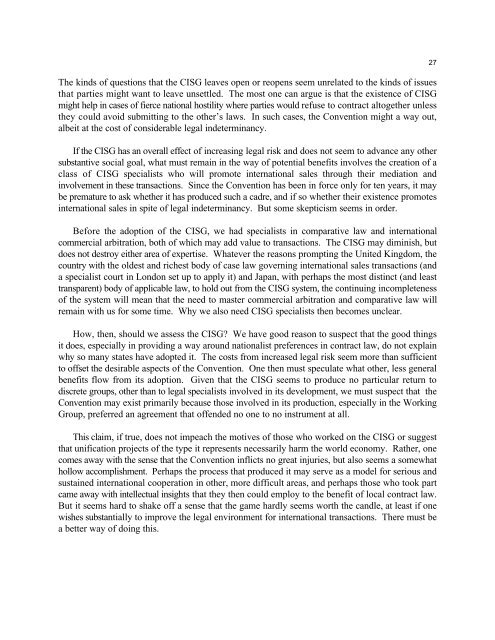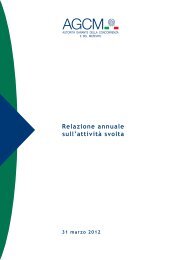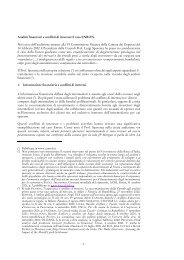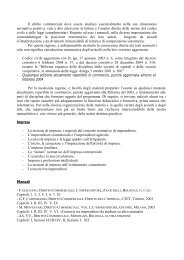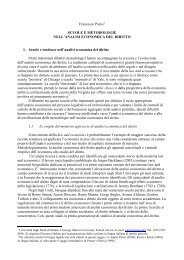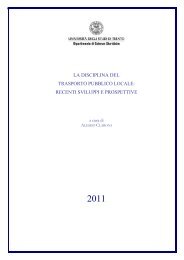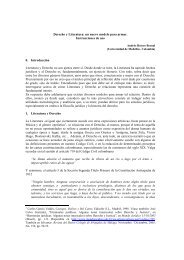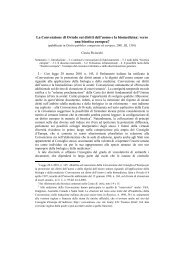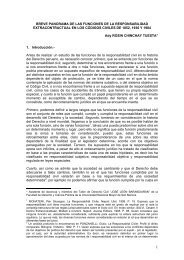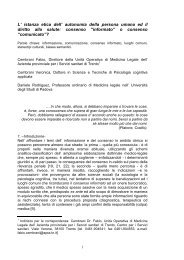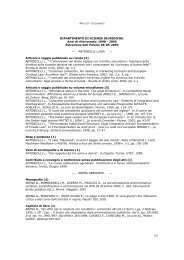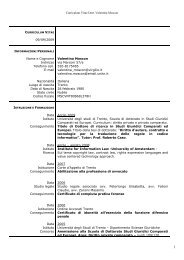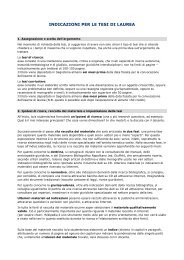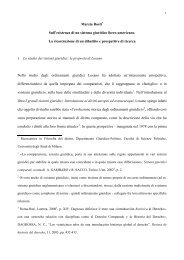The Futility of Unification and Harmonization in International ...
The Futility of Unification and Harmonization in International ...
The Futility of Unification and Harmonization in International ...
Create successful ePaper yourself
Turn your PDF publications into a flip-book with our unique Google optimized e-Paper software.
<strong>The</strong> k<strong>in</strong>ds <strong>of</strong> questions that the CISG leaves open or reopens seem unrelated to the k<strong>in</strong>ds <strong>of</strong> issuesthat parties might want to leave unsettled. <strong>The</strong> most one can argue is that the existence <strong>of</strong> CISGmight help <strong>in</strong> cases <strong>of</strong> fierce national hostility where parties would refuse to contract altogether unlessthey could avoid submitt<strong>in</strong>g to the other’s laws. In such cases, the Convention might a way out,albeit at the cost <strong>of</strong> considerable legal <strong>in</strong>determ<strong>in</strong>ancy.If the CISG has an overall effect <strong>of</strong> <strong>in</strong>creas<strong>in</strong>g legal risk <strong>and</strong> does not seem to advance any othersubstantive social goal, what must rema<strong>in</strong> <strong>in</strong> the way <strong>of</strong> potential benefits <strong>in</strong>volves the creation <strong>of</strong> aclass <strong>of</strong> CISG specialists who will promote <strong>in</strong>ternational sales through their mediation <strong>and</strong><strong>in</strong>volvement <strong>in</strong> these transactions. S<strong>in</strong>ce the Convention has been <strong>in</strong> force only for ten years, it maybe premature to ask whether it has produced such a cadre, <strong>and</strong> if so whether their existence promotes<strong>in</strong>ternational sales <strong>in</strong> spite <strong>of</strong> legal <strong>in</strong>determ<strong>in</strong>ancy. But some skepticism seems <strong>in</strong> order.Before the adoption <strong>of</strong> the CISG, we had specialists <strong>in</strong> comparative law <strong>and</strong> <strong>in</strong>ternationalcommercial arbitration, both <strong>of</strong> which may add value to transactions. <strong>The</strong> CISG may dim<strong>in</strong>ish, butdoes not destroy either area <strong>of</strong> expertise. Whatever the reasons prompt<strong>in</strong>g the United K<strong>in</strong>gdom, thecountry with the oldest <strong>and</strong> richest body <strong>of</strong> case law govern<strong>in</strong>g <strong>in</strong>ternational sales transactions (<strong>and</strong>a specialist court <strong>in</strong> London set up to apply it) <strong>and</strong> Japan, with perhaps the most dist<strong>in</strong>ct (<strong>and</strong> leasttransparent) body <strong>of</strong> applicable law, to hold out from the CISG system, the cont<strong>in</strong>u<strong>in</strong>g <strong>in</strong>completeness<strong>of</strong> the system will mean that the need to master commercial arbitration <strong>and</strong> comparative law willrema<strong>in</strong> with us for some time. Why we also need CISG specialists then becomes unclear.How, then, should we assess the CISG? We have good reason to suspect that the good th<strong>in</strong>gsit does, especially <strong>in</strong> provid<strong>in</strong>g a way around nationalist preferences <strong>in</strong> contract law, do not expla<strong>in</strong>why so many states have adopted it. <strong>The</strong> costs from <strong>in</strong>creased legal risk seem more than sufficientto <strong>of</strong>fset the desirable aspects <strong>of</strong> the Convention. One then must speculate what other, less generalbenefits flow from its adoption. Given that the CISG seems to produce no particular return todiscrete groups, other than to legal specialists <strong>in</strong>volved <strong>in</strong> its development, we must suspect that theConvention may exist primarily because those <strong>in</strong>volved <strong>in</strong> its production, especially <strong>in</strong> the Work<strong>in</strong>gGroup, preferred an agreement that <strong>of</strong>fended no one to no <strong>in</strong>strument at all.This claim, if true, does not impeach the motives <strong>of</strong> those who worked on the CISG or suggestthat unification projects <strong>of</strong> the type it represents necessarily harm the world economy. Rather, onecomes away with the sense that the Convention <strong>in</strong>flicts no great <strong>in</strong>juries, but also seems a somewhathollow accomplishment. Perhaps the process that produced it may serve as a model for serious <strong>and</strong>susta<strong>in</strong>ed <strong>in</strong>ternational cooperation <strong>in</strong> other, more difficult areas, <strong>and</strong> perhaps those who took partcame away with <strong>in</strong>tellectual <strong>in</strong>sights that they then could employ to the benefit <strong>of</strong> local contract law.But it seems hard to shake <strong>of</strong>f a sense that the game hardly seems worth the c<strong>and</strong>le, at least if onewishes substantially to improve the legal environment for <strong>in</strong>ternational transactions. <strong>The</strong>re must bea better way <strong>of</strong> do<strong>in</strong>g this.27


